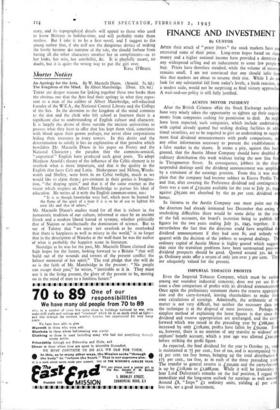Shorter Notices
An Apology for the Arts. By W. Macneile Dixon. (Arnold. 7s. 6d.) The Kingdom of the Mind. By Albert Mansbridge. (Dent. 12s. 6d.) THERE are deeper reasons for linking together these two books than the obvious one that the Arts find their apology in what they repre- sent to a man of the calibre of Albert Mansbridge, self-educated founder of the W.E.A., the National Central Library and the College of the Sea. In.the devotion to the kingdom of the mind common to the don and the clerk who left school at fourteen there is a significant clue to understanding of English culture and Character. It is largely the desire of those outside the ancient universities to possess what they have to offer that has kept them vital, sometimes with blood upon their gowns perhaps, but never close corporations hiding their treasures in ivory towers. In this desire and the determination to satisfy it lies an explanation of that paradox which bewilders Mr. Macneile Dixon in his paper on Poetry and the National Character ; the paradox that the common-sensical, " unpoetical " English have produced such great poets. To adopt Matthew Arnold's theory of the influence of the Celtic element is.to overlook what is more important, and that is the quality in the English that fuses Celt and Latin. Shakespeare and Milton, Words- worth and Shelley, were born in no Celtic twilight, much as we would like to claim them ; pre-eminent in their genius is Imagina- tion, " the :limping spirit," and that is of the same essence as the vision which inspires an Albert Mansbridge to pursue his ideal of education. He writes of it with the English common-sense, too: " It is as though knowledge were fuel, which must be burned by the flame of the spirit of a man if it is to be of use to lighten his own life and that of others."
Mr. Macneile Dixon's studies stand for all that is richest in the humanistic tradition of our culture, informed at once by an ancient Greek and a modern liberal hatred of tyranny, whether politically that of Nazism or intellectually the domination of science. But to say of Tolstoy that " we must not overlook as he overlooked that there is happiness as well as misery in the world," is to forget that in the description of Natasha at the wolf-hunt he was the author of what is probably the happiest scene in literature.
Nostalgic as he was for the past, Mr. Macneile Dixon claimed also high hopes for the future, looking forward to a Britain " that will build out of the wounds and terrors of the present conflict the loftiest memorial of her spirit." The real pledge that she will do so is the faith of Mr. Mansbridge in the present: " No people can escape their past," he writes, " inevitable as it is. They must use it in the living present, the glory of the present to be, moving on in the mind of man to a limitless future."


























 Previous page
Previous page